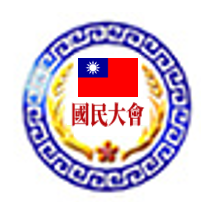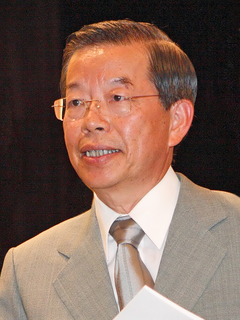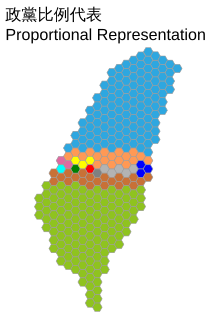
The politics of the Republic of China take place in a framework of a representative democratic republic, whereby the President is head of state and the Premier is head of government, and of a multi-party system. Executive power is exercised by the government. Legislative power is vested in primarily with the parliament and limited by government. The Judiciary is independent of the executive and the legislature. The party system is dominated by the Kuomintang, which favors closer links to mainland China, and the Democratic Progressive Party, which favors Taiwanese independence.

Green Party Taiwan is a political party in Taiwan established on 25 January 1996. Although the party is sympathetic to Taiwan nationalism and shares a number of centre-left positions with the Pan-Green Coalition, the party emphasizes campaigning primarily on social and environmental issues. The party is not a member of, and should not be confused with, the Pan-Green Coalition. Green Party Taiwan is a member of the Asia Pacific Greens Federation and participates in the Global Greens.

The Legislative Yuan is the unicameral legislature of the Republic of China now based in Taiwan. It is one of the five branches of government stipulated by the Constitution of the Republic of China, which follows Sun Yat-sen's Three Principles of the People.

The National Assembly were several national parliamentary government organizations of the Republic of China, now commonly known as Taiwan.

The Tangwai movement, simply Tangwai, was a political movement in the Republic of China (Taiwan) in the mid-1970s and early 1980s. Although the Kuomintang (KMT) had allowed contested elections for a small number of seats in Legislative Yuan, opposition parties were still forbidden. As a result, many opponents of the KMT, officially classified as independents, ran and were elected as members "outside the party."

This is a timeline of the Republic of China.

The Election for the 5th Legislative Yuan of Taiwan was held on 1 December 2001. All 225 seats of the Legislative Yuan were up for election: 168 elected by popular vote, 41 elected on the basis of the proportion of nationwide votes received by participating political parties, eight elected from overseas Chinese constituencies on the basis of the proportion of nationwide votes received by participating political parties, eight elected by popular vote among the Taiwanese aboriginal populations. Members served three year terms from February 1, 2002 to February 1, 2005.

An election for the National Assembly took place in Taiwan on Saturday 14 May 2005, from 07:30 to 16:00 local time. It elected an ad hoc National Assembly whose only function was to serve as a constitutional convention in order to approve or reject amendments to the Constitution of the Republic of China already proposed by the Legislative Yuan. The results indicated that the amendments would be approved, as the parties supporting them won an overwhelming majority, and indeed the amendments were passed on June 7, 2005. The election was carried out using purely the party-list proportional representation system. The official campaign period was 07:00 to 22:00 each day from 4 May 2005 to 13 May 2005. Official election broadcasts by the ad hoc coalitions and (established) parties were provided by the Public Television Service Taiwan on 7 May 2005; several unofficial debates were also arranged. Notably, this election saw the temporary breakdown of the traditional two-coalition system in Taiwanese politics: instead of dividing into the Pan-Green Coalition and Pan-Blue Coalition over the political status of Taiwan, the parties divided themselves into larger and smaller parties, with the larger Democratic Progressive Party and Kuomintang in support of the amendments and the smaller People First Party and Taiwan Solidarity Union against them.

The Election for the 7th Legislative Yuan of Taiwan was held on January 12, 2008. The results gave the Kuomintang (KMT) and the Pan-Blue Coalition a supermajority in the legislature, handing a heavy defeat to then-President Chen Shui-bian's Democratic Progressive Party, which won the remaining 27 seats only. The junior partner in the Pan-Green Coalition, the Taiwan Solidarity Union, won no seats.
The first supplementary elections took place for the National Assembly and the Legislative Yuan in the Republic of China on 20 December 1969. Voter turnout was 54.7% and 55.0% respectively.
The second supplementary elections took place for the National Assembly and Legislative Yuan of the Republic of China (Taiwan) on 23 December 1972.
The third supplementary elections for the Legislative Yuan were held in the Republic of China (Taiwan) on 20 December 1975.
The fourth supplementary elections for the National Assembly and Legislative Yuan were held in the Republic of China (Taiwan) on 6 December 1980.
The fifth supplementary elections for the Legislative Yuan were held in the Republic of China (Taiwan) on 3 December 1983.
The sixth supplementary elections for the National Assembly and Legislative Yuan were held in the Republic of China (Taiwan) on 6 December 1986.
General elections were held in Taiwan, officially the Republic of China, on Saturday, 16 January 2016 to elect the 14th President and Vice President of the Republic of China, and all 113 members of the ninth Legislative Yuan:

The 9th Republic of China Legislative Yuan election was held on 16 January 2016 for all 113 seats to the Legislative Yuan in Taiwan. The Democratic Progressive Party (DPP) led by Tsai Ing-wen, who also won the presidential election on the same day, secured a majority for the first time in history by winning 68 seats. The ruling Kuomintang (KMT) lost both the presidency and its legislative majority and returned to the opposition.
General elections will be held in Taiwan, officially the Republic of China, on 11 January 2020 to elect the 15th President and Vice President of the Republic of China, and all 113 members of the 10th Legislative Yuan.

Local elections were held on 24 November 2018 in Taiwan, to elect county magistrates, county (city) councilors, township mayors, township councilors and chiefs of village (borough) in 6 municipalities and 16 counties (cities). Elected officials would serve a four-year term. Polling stations were open from 08:00 to 16:00 on the election day.

The 10th Republic of China Legislative Yuan election is scheduled on 11 January 2020 for all 113 seats to the Legislative Yuan, together with presidential election in Taiwan. The term of the Legislative Yuan will begin on 1 February 2020.










